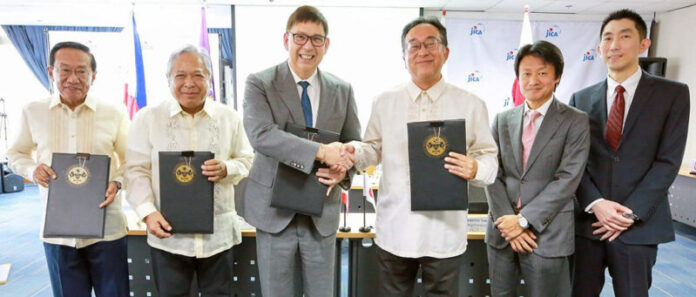
-
PH, Japan ink P92.9B loan for Metro Manila Subway, Dalton Pass projects
-
The loan for the third tranche of financing for the Metro Manila Subway Project Phase 1 is valued at JPY 150 billion
-
The first tranche of financing for the Dalton Pass East Alignment Road Project is worth JPY 100 billion
The Philippines and Japan inked a JPY 250-billion (about P92.9 billion) loan agreement for the construction of the Metro Manila Subway and the Dalton Pass East Alignment Road (DPEAR), the Department of Finance said in a statement.
Finance Secretary Ralph Recto, on behalf of the Philippine Government, and Japan International Cooperation Agency (JICA) Chief Representative Takema Sakamoto signed the deal for the third tranche of financing for the Metro Manila Subway Project (MMSP) Phase 1, valued at JPY 150 billion; and the first tranche of financing for the DPEAR project (DPEARP) valued at JPY 100 billion at the JICA Philippine Office in Makati on March 26.
With a total project cost of P488.48 billion, MMSP Phase 1 marks the country’s maiden underground mass transport system and stands as the third-largest initiative under the Marcos administration’s Build Better More program.
READ: Metro Manila subway project remains on schedule
The Embassy of Japan in the Philippines announced that their Deputy Chief of Mission, Matsuda Kenichi, and Foreign Secretary Enrique Manalo have officially signed the Exchange of Notes for the two pivotal infrastructure projects.
Meanwhile, with a total project cost of P67.4 billion, DPEARP is a crucial infrastructure endeavor in Central and Northern Luzon. It involves the construction of a 23-kilometer alternative road bypassing the existing 77-kilometer Dalton Pass East Bypass Route, along with a 6.121-kilometer tube section and 10 bridges spanning a total length of 5.828 kilometers.
Recto emphasized the DPEARP is poised to enhance transportation safety for local communities and facilitate a more seamless distribution of agricultural products. This development directly translates to tangible benefits for farmers in the Cagayan Valley Region.
The projects received highly concessional financing terms under JICA’s Special Terms for Economic Partnership, with an interest rate of 0.30% per annum for non-consulting services and 0.20% per annum for consulting services, to be repaid over 40 years, inclusive of a 10-year grace period.
The finance chief also underscored the importance of Japanese technology in the projects, ensuring top-notch infrastructure investments aligned with global standards. He expressed gratitude to JICA for its support in delivering safe, resilient, and responsive infrastructure projects vital to the Filipino people.
Officials including Department of Transportation Secretary Jaime Bautista, Department of Public Works and Highways Secretary Manuel Bonoan, and Embassy of Japan Economic Minister Nihei Daisuke, witnessed the signing of the loan agreements.
The subway project encompasses the construction of a depot and a 33-kilometer railway system with 17 stations connecting Valenzuela City to Bicutan, with a branch line extending to Ninoy Aquino International Airport Terminal 3 in Parañaque City.
Scheduled for completion in 2029, the subway is expected to slash travel time from Valenzuela to NAIA from 1 hour and 30 minutes to just 35 minutes, accommodating 519,000 passengers daily upon full operations.
The Philippines and Japan inked a JPY 250-billion (about P92.9 billion) loan agreement for the construction of the Metro Manila Subway and the Dalton Pass East Alignment Road.




